Learning Styles, Employer Obligations, and Government Role Analysis
VerifiedAdded on 2020/06/06
|8
|2097
|78
Report
AI Summary
This report delves into the Honey and Mumford learning style theory, outlining the four distinct learning styles: Activists, Pragmatists, Theorists, and Reflectors, along with the four types of learners: Auditory, Kinesthetic, Reading/Writing, and Visual. The report then transitions to the realm of potential employers, specifically addressing legal obligations and responsibilities under Australian law. It examines employer duties related to mental health, discrimination, workplace legislation, and privacy. The report further explores employers' moral obligations, including providing a safe work environment and fair treatment. It also discusses the government's role in addressing unfair acts and ensuring employee rights, referencing the Fair Work Act 2009 and the Disability Discrimination Act. Finally, the report outlines the author's own obligations and responsibilities as an employer, including tax obligations and adherence to employment-related legislation. The report concludes with a comprehensive list of references.
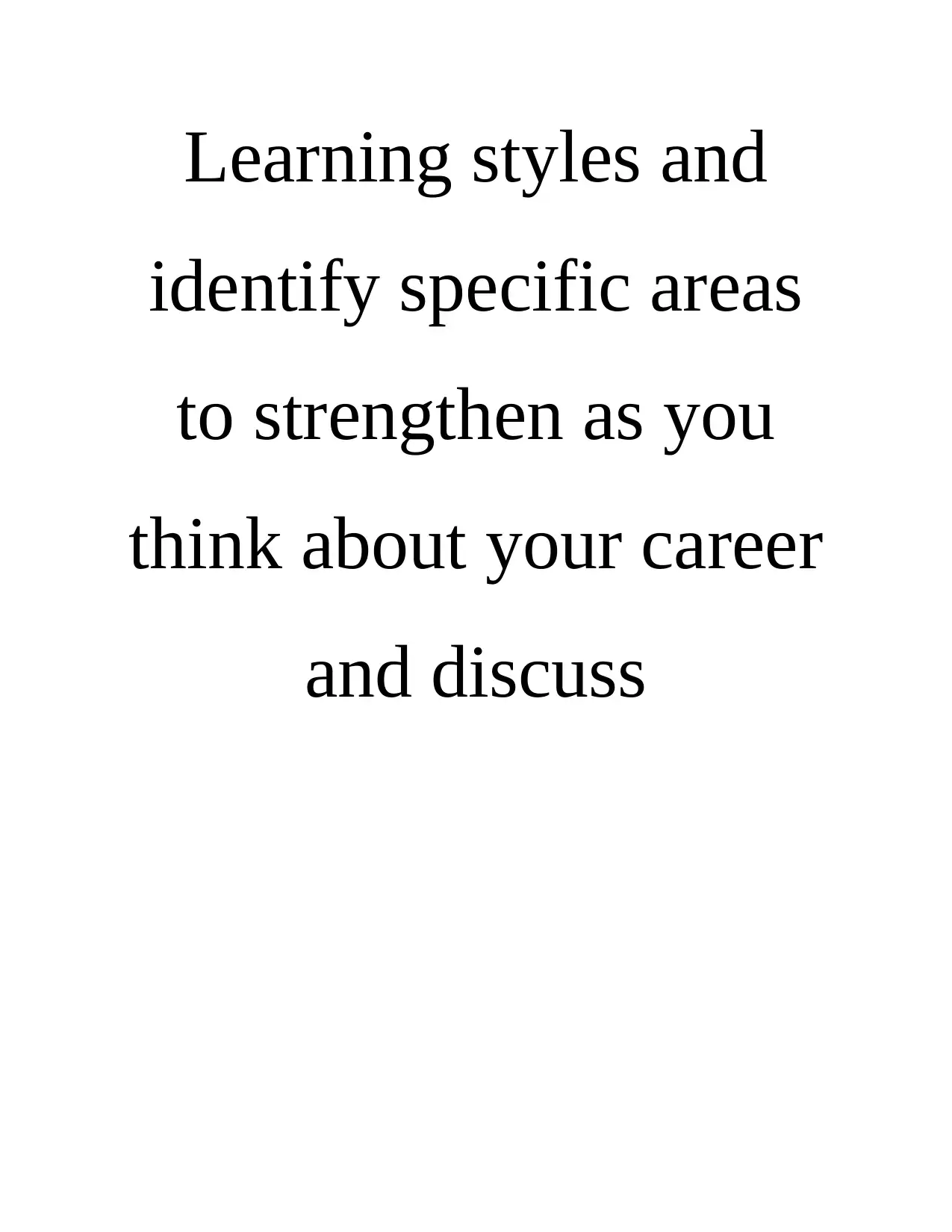
Learning styles and
identify specific areas
to strengthen as you
think about your career
and discuss
identify specific areas
to strengthen as you
think about your career
and discuss
Paraphrase This Document
Need a fresh take? Get an instant paraphrase of this document with our AI Paraphraser
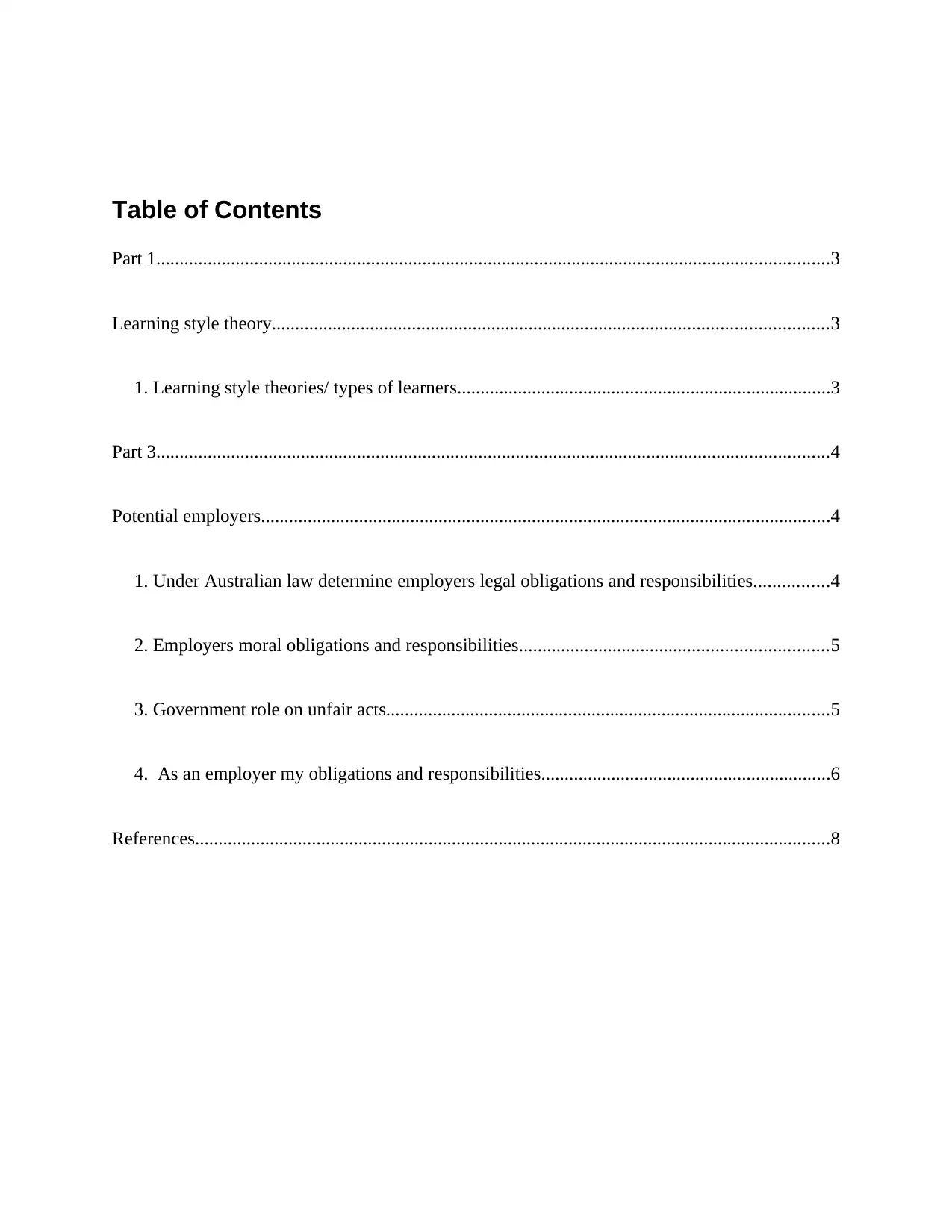
Table of Contents
Part 1................................................................................................................................................3
Learning style theory.......................................................................................................................3
1. Learning style theories/ types of learners................................................................................3
Part 3................................................................................................................................................4
Potential employers..........................................................................................................................4
1. Under Australian law determine employers legal obligations and responsibilities................4
2. Employers moral obligations and responsibilities..................................................................5
3. Government role on unfair acts...............................................................................................5
4. As an employer my obligations and responsibilities..............................................................6
References........................................................................................................................................8
Part 1................................................................................................................................................3
Learning style theory.......................................................................................................................3
1. Learning style theories/ types of learners................................................................................3
Part 3................................................................................................................................................4
Potential employers..........................................................................................................................4
1. Under Australian law determine employers legal obligations and responsibilities................4
2. Employers moral obligations and responsibilities..................................................................5
3. Government role on unfair acts...............................................................................................5
4. As an employer my obligations and responsibilities..............................................................6
References........................................................................................................................................8
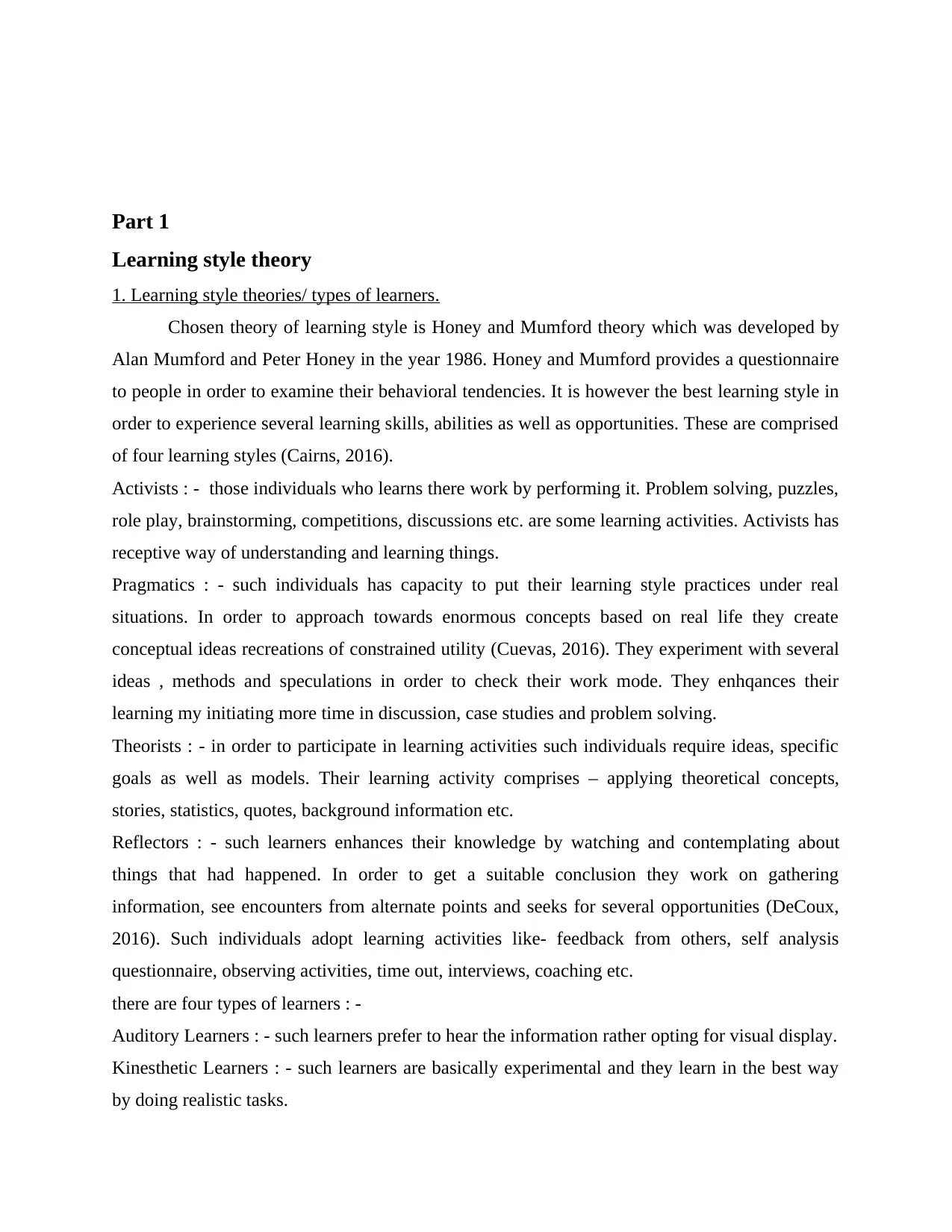
Part 1
Learning style theory
1. Learning style theories/ types of learners.
Chosen theory of learning style is Honey and Mumford theory which was developed by
Alan Mumford and Peter Honey in the year 1986. Honey and Mumford provides a questionnaire
to people in order to examine their behavioral tendencies. It is however the best learning style in
order to experience several learning skills, abilities as well as opportunities. These are comprised
of four learning styles (Cairns, 2016).
Activists : - those individuals who learns there work by performing it. Problem solving, puzzles,
role play, brainstorming, competitions, discussions etc. are some learning activities. Activists has
receptive way of understanding and learning things.
Pragmatics : - such individuals has capacity to put their learning style practices under real
situations. In order to approach towards enormous concepts based on real life they create
conceptual ideas recreations of constrained utility (Cuevas, 2016). They experiment with several
ideas , methods and speculations in order to check their work mode. They enhqances their
learning my initiating more time in discussion, case studies and problem solving.
Theorists : - in order to participate in learning activities such individuals require ideas, specific
goals as well as models. Their learning activity comprises – applying theoretical concepts,
stories, statistics, quotes, background information etc.
Reflectors : - such learners enhances their knowledge by watching and contemplating about
things that had happened. In order to get a suitable conclusion they work on gathering
information, see encounters from alternate points and seeks for several opportunities (DeCoux,
2016). Such individuals adopt learning activities like- feedback from others, self analysis
questionnaire, observing activities, time out, interviews, coaching etc.
there are four types of learners : -
Auditory Learners : - such learners prefer to hear the information rather opting for visual display.
Kinesthetic Learners : - such learners are basically experimental and they learn in the best way
by doing realistic tasks.
Learning style theory
1. Learning style theories/ types of learners.
Chosen theory of learning style is Honey and Mumford theory which was developed by
Alan Mumford and Peter Honey in the year 1986. Honey and Mumford provides a questionnaire
to people in order to examine their behavioral tendencies. It is however the best learning style in
order to experience several learning skills, abilities as well as opportunities. These are comprised
of four learning styles (Cairns, 2016).
Activists : - those individuals who learns there work by performing it. Problem solving, puzzles,
role play, brainstorming, competitions, discussions etc. are some learning activities. Activists has
receptive way of understanding and learning things.
Pragmatics : - such individuals has capacity to put their learning style practices under real
situations. In order to approach towards enormous concepts based on real life they create
conceptual ideas recreations of constrained utility (Cuevas, 2016). They experiment with several
ideas , methods and speculations in order to check their work mode. They enhqances their
learning my initiating more time in discussion, case studies and problem solving.
Theorists : - in order to participate in learning activities such individuals require ideas, specific
goals as well as models. Their learning activity comprises – applying theoretical concepts,
stories, statistics, quotes, background information etc.
Reflectors : - such learners enhances their knowledge by watching and contemplating about
things that had happened. In order to get a suitable conclusion they work on gathering
information, see encounters from alternate points and seeks for several opportunities (DeCoux,
2016). Such individuals adopt learning activities like- feedback from others, self analysis
questionnaire, observing activities, time out, interviews, coaching etc.
there are four types of learners : -
Auditory Learners : - such learners prefer to hear the information rather opting for visual display.
Kinesthetic Learners : - such learners are basically experimental and they learn in the best way
by doing realistic tasks.
⊘ This is a preview!⊘
Do you want full access?
Subscribe today to unlock all pages.

Trusted by 1+ million students worldwide
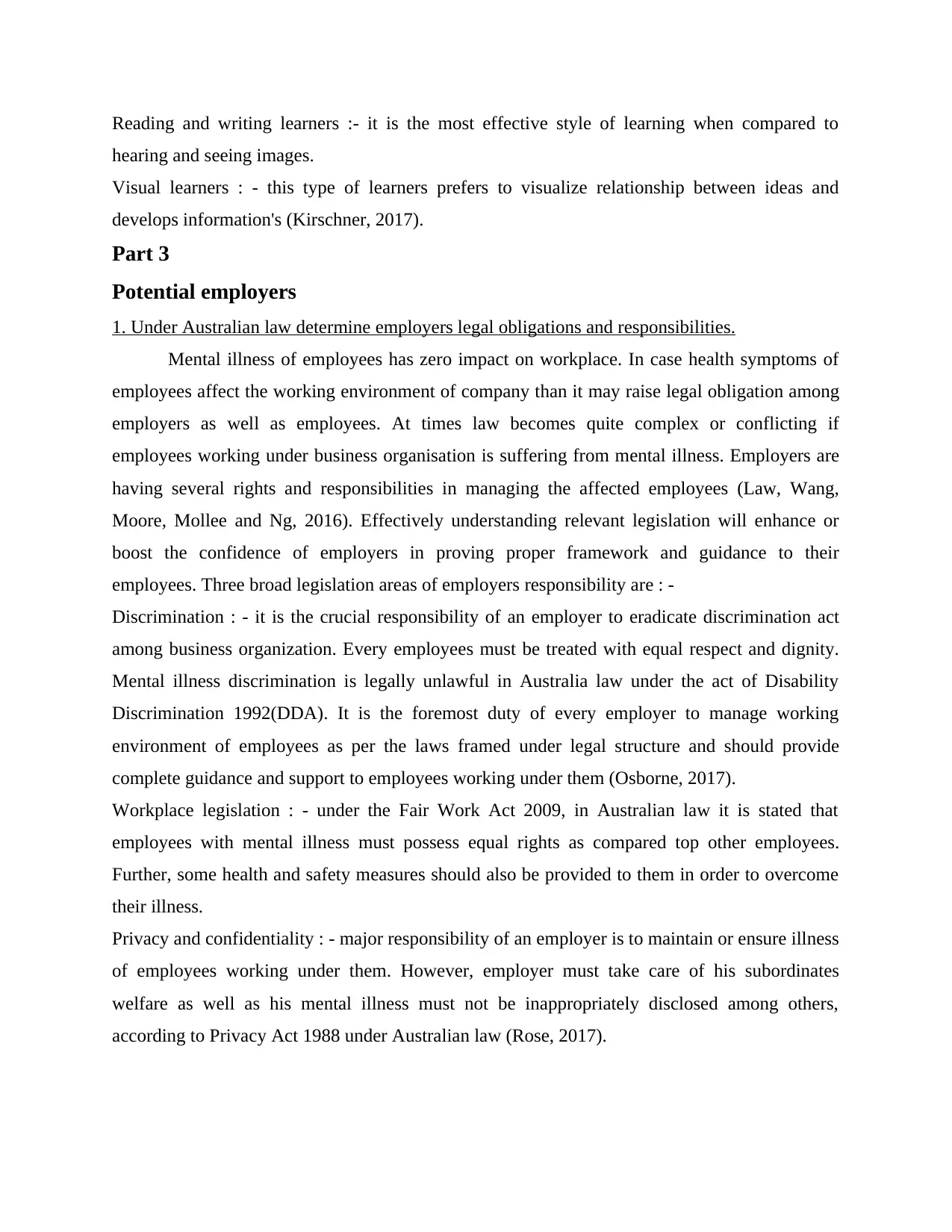
Reading and writing learners :- it is the most effective style of learning when compared to
hearing and seeing images.
Visual learners : - this type of learners prefers to visualize relationship between ideas and
develops information's (Kirschner, 2017).
Part 3
Potential employers
1. Under Australian law determine employers legal obligations and responsibilities.
Mental illness of employees has zero impact on workplace. In case health symptoms of
employees affect the working environment of company than it may raise legal obligation among
employers as well as employees. At times law becomes quite complex or conflicting if
employees working under business organisation is suffering from mental illness. Employers are
having several rights and responsibilities in managing the affected employees (Law, Wang,
Moore, Mollee and Ng, 2016). Effectively understanding relevant legislation will enhance or
boost the confidence of employers in proving proper framework and guidance to their
employees. Three broad legislation areas of employers responsibility are : -
Discrimination : - it is the crucial responsibility of an employer to eradicate discrimination act
among business organization. Every employees must be treated with equal respect and dignity.
Mental illness discrimination is legally unlawful in Australia law under the act of Disability
Discrimination 1992(DDA). It is the foremost duty of every employer to manage working
environment of employees as per the laws framed under legal structure and should provide
complete guidance and support to employees working under them (Osborne, 2017).
Workplace legislation : - under the Fair Work Act 2009, in Australian law it is stated that
employees with mental illness must possess equal rights as compared top other employees.
Further, some health and safety measures should also be provided to them in order to overcome
their illness.
Privacy and confidentiality : - major responsibility of an employer is to maintain or ensure illness
of employees working under them. However, employer must take care of his subordinates
welfare as well as his mental illness must not be inappropriately disclosed among others,
according to Privacy Act 1988 under Australian law (Rose, 2017).
hearing and seeing images.
Visual learners : - this type of learners prefers to visualize relationship between ideas and
develops information's (Kirschner, 2017).
Part 3
Potential employers
1. Under Australian law determine employers legal obligations and responsibilities.
Mental illness of employees has zero impact on workplace. In case health symptoms of
employees affect the working environment of company than it may raise legal obligation among
employers as well as employees. At times law becomes quite complex or conflicting if
employees working under business organisation is suffering from mental illness. Employers are
having several rights and responsibilities in managing the affected employees (Law, Wang,
Moore, Mollee and Ng, 2016). Effectively understanding relevant legislation will enhance or
boost the confidence of employers in proving proper framework and guidance to their
employees. Three broad legislation areas of employers responsibility are : -
Discrimination : - it is the crucial responsibility of an employer to eradicate discrimination act
among business organization. Every employees must be treated with equal respect and dignity.
Mental illness discrimination is legally unlawful in Australia law under the act of Disability
Discrimination 1992(DDA). It is the foremost duty of every employer to manage working
environment of employees as per the laws framed under legal structure and should provide
complete guidance and support to employees working under them (Osborne, 2017).
Workplace legislation : - under the Fair Work Act 2009, in Australian law it is stated that
employees with mental illness must possess equal rights as compared top other employees.
Further, some health and safety measures should also be provided to them in order to overcome
their illness.
Privacy and confidentiality : - major responsibility of an employer is to maintain or ensure illness
of employees working under them. However, employer must take care of his subordinates
welfare as well as his mental illness must not be inappropriately disclosed among others,
according to Privacy Act 1988 under Australian law (Rose, 2017).
Paraphrase This Document
Need a fresh take? Get an instant paraphrase of this document with our AI Paraphraser
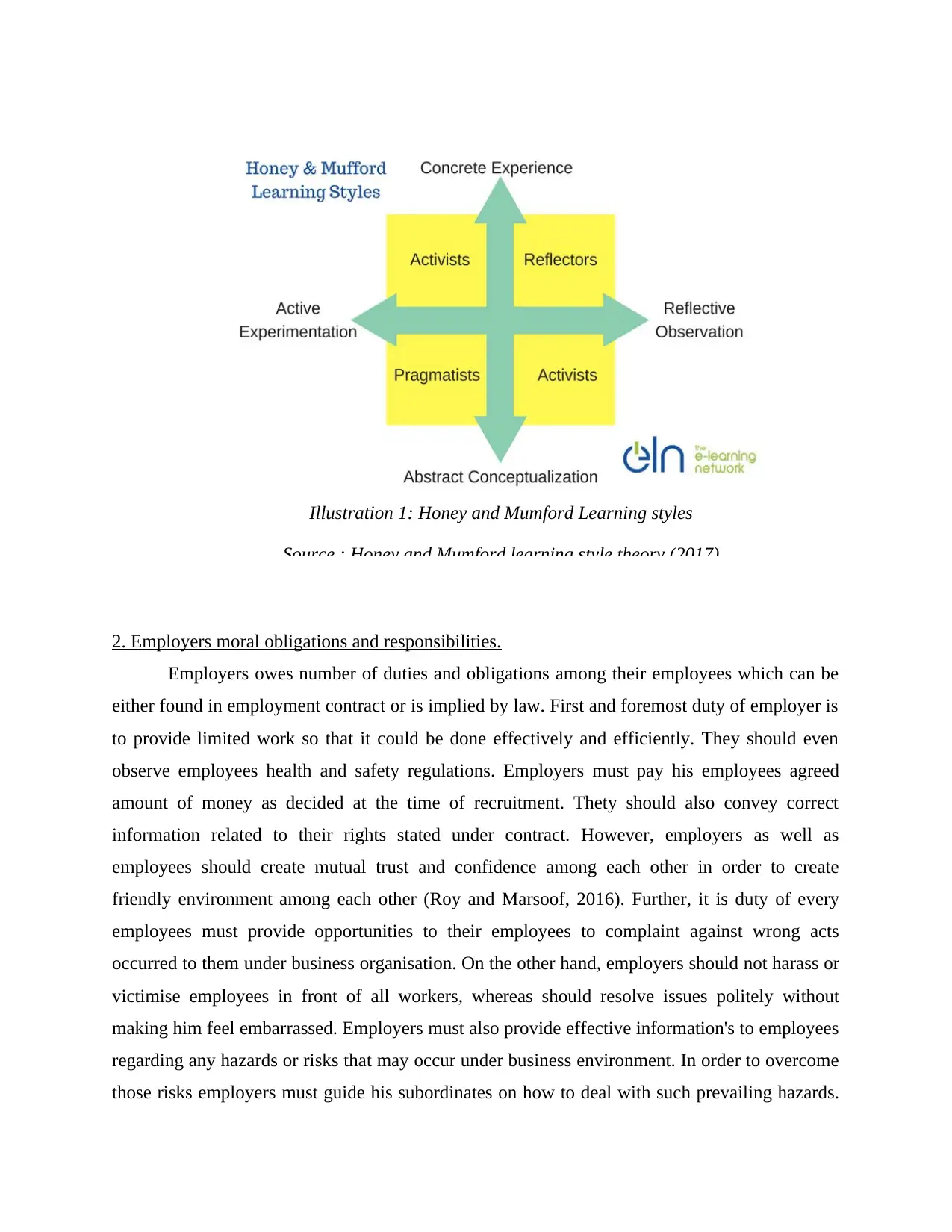
2. Employers moral obligations and responsibilities.
Employers owes number of duties and obligations among their employees which can be
either found in employment contract or is implied by law. First and foremost duty of employer is
to provide limited work so that it could be done effectively and efficiently. They should even
observe employees health and safety regulations. Employers must pay his employees agreed
amount of money as decided at the time of recruitment. Thety should also convey correct
information related to their rights stated under contract. However, employers as well as
employees should create mutual trust and confidence among each other in order to create
friendly environment among each other (Roy and Marsoof, 2016). Further, it is duty of every
employees must provide opportunities to their employees to complaint against wrong acts
occurred to them under business organisation. On the other hand, employers should not harass or
victimise employees in front of all workers, whereas should resolve issues politely without
making him feel embarrassed. Employers must also provide effective information's to employees
regarding any hazards or risks that may occur under business environment. In order to overcome
those risks employers must guide his subordinates on how to deal with such prevailing hazards.
Illustration 1: Honey and Mumford Learning styles
Source : Honey and Mumford learning style theory (2017)
Employers owes number of duties and obligations among their employees which can be
either found in employment contract or is implied by law. First and foremost duty of employer is
to provide limited work so that it could be done effectively and efficiently. They should even
observe employees health and safety regulations. Employers must pay his employees agreed
amount of money as decided at the time of recruitment. Thety should also convey correct
information related to their rights stated under contract. However, employers as well as
employees should create mutual trust and confidence among each other in order to create
friendly environment among each other (Roy and Marsoof, 2016). Further, it is duty of every
employees must provide opportunities to their employees to complaint against wrong acts
occurred to them under business organisation. On the other hand, employers should not harass or
victimise employees in front of all workers, whereas should resolve issues politely without
making him feel embarrassed. Employers must also provide effective information's to employees
regarding any hazards or risks that may occur under business environment. In order to overcome
those risks employers must guide his subordinates on how to deal with such prevailing hazards.
Illustration 1: Honey and Mumford Learning styles
Source : Honey and Mumford learning style theory (2017)
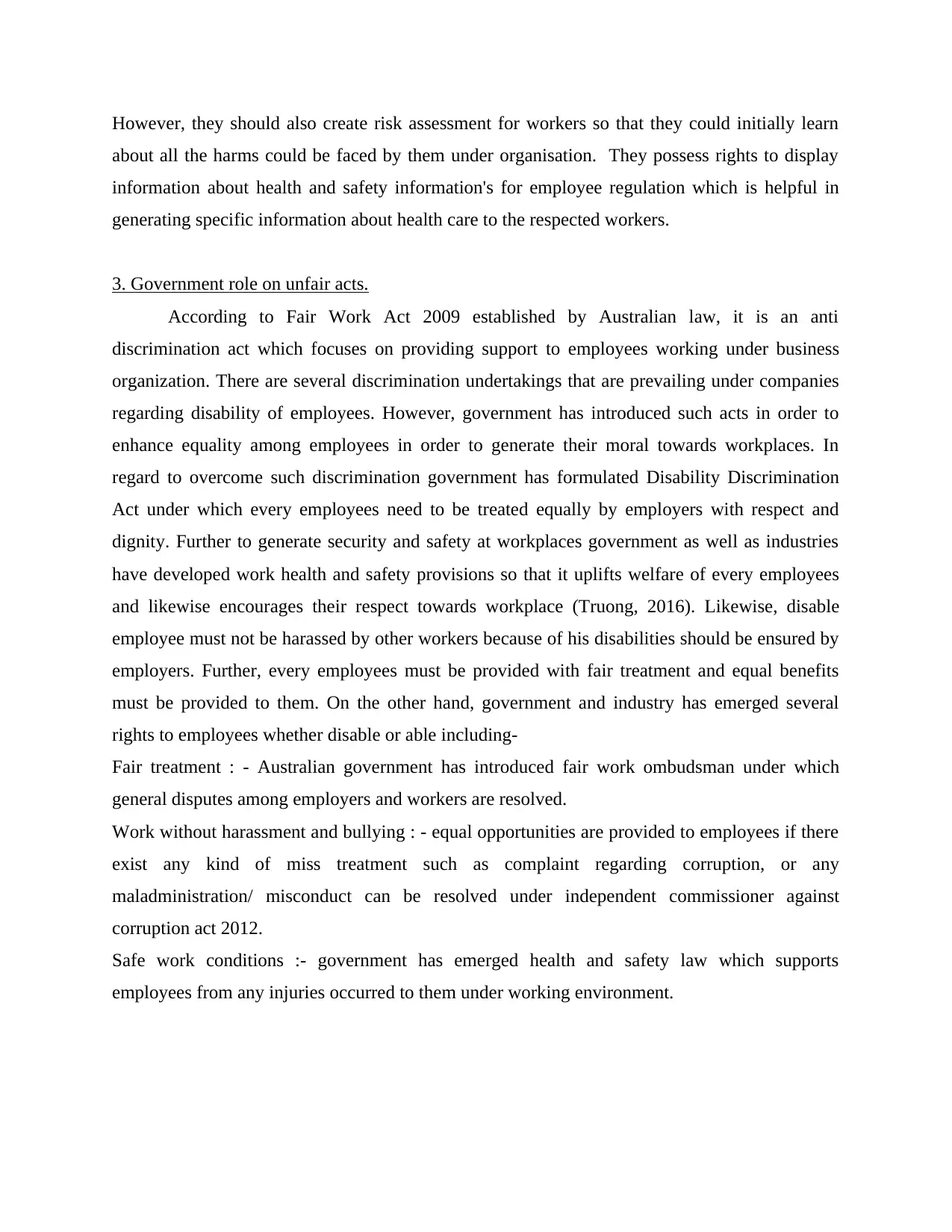
However, they should also create risk assessment for workers so that they could initially learn
about all the harms could be faced by them under organisation. They possess rights to display
information about health and safety information's for employee regulation which is helpful in
generating specific information about health care to the respected workers.
3. Government role on unfair acts.
According to Fair Work Act 2009 established by Australian law, it is an anti
discrimination act which focuses on providing support to employees working under business
organization. There are several discrimination undertakings that are prevailing under companies
regarding disability of employees. However, government has introduced such acts in order to
enhance equality among employees in order to generate their moral towards workplaces. In
regard to overcome such discrimination government has formulated Disability Discrimination
Act under which every employees need to be treated equally by employers with respect and
dignity. Further to generate security and safety at workplaces government as well as industries
have developed work health and safety provisions so that it uplifts welfare of every employees
and likewise encourages their respect towards workplace (Truong, 2016). Likewise, disable
employee must not be harassed by other workers because of his disabilities should be ensured by
employers. Further, every employees must be provided with fair treatment and equal benefits
must be provided to them. On the other hand, government and industry has emerged several
rights to employees whether disable or able including-
Fair treatment : - Australian government has introduced fair work ombudsman under which
general disputes among employers and workers are resolved.
Work without harassment and bullying : - equal opportunities are provided to employees if there
exist any kind of miss treatment such as complaint regarding corruption, or any
maladministration/ misconduct can be resolved under independent commissioner against
corruption act 2012.
Safe work conditions :- government has emerged health and safety law which supports
employees from any injuries occurred to them under working environment.
about all the harms could be faced by them under organisation. They possess rights to display
information about health and safety information's for employee regulation which is helpful in
generating specific information about health care to the respected workers.
3. Government role on unfair acts.
According to Fair Work Act 2009 established by Australian law, it is an anti
discrimination act which focuses on providing support to employees working under business
organization. There are several discrimination undertakings that are prevailing under companies
regarding disability of employees. However, government has introduced such acts in order to
enhance equality among employees in order to generate their moral towards workplaces. In
regard to overcome such discrimination government has formulated Disability Discrimination
Act under which every employees need to be treated equally by employers with respect and
dignity. Further to generate security and safety at workplaces government as well as industries
have developed work health and safety provisions so that it uplifts welfare of every employees
and likewise encourages their respect towards workplace (Truong, 2016). Likewise, disable
employee must not be harassed by other workers because of his disabilities should be ensured by
employers. Further, every employees must be provided with fair treatment and equal benefits
must be provided to them. On the other hand, government and industry has emerged several
rights to employees whether disable or able including-
Fair treatment : - Australian government has introduced fair work ombudsman under which
general disputes among employers and workers are resolved.
Work without harassment and bullying : - equal opportunities are provided to employees if there
exist any kind of miss treatment such as complaint regarding corruption, or any
maladministration/ misconduct can be resolved under independent commissioner against
corruption act 2012.
Safe work conditions :- government has emerged health and safety law which supports
employees from any injuries occurred to them under working environment.
⊘ This is a preview!⊘
Do you want full access?
Subscribe today to unlock all pages.

Trusted by 1+ million students worldwide
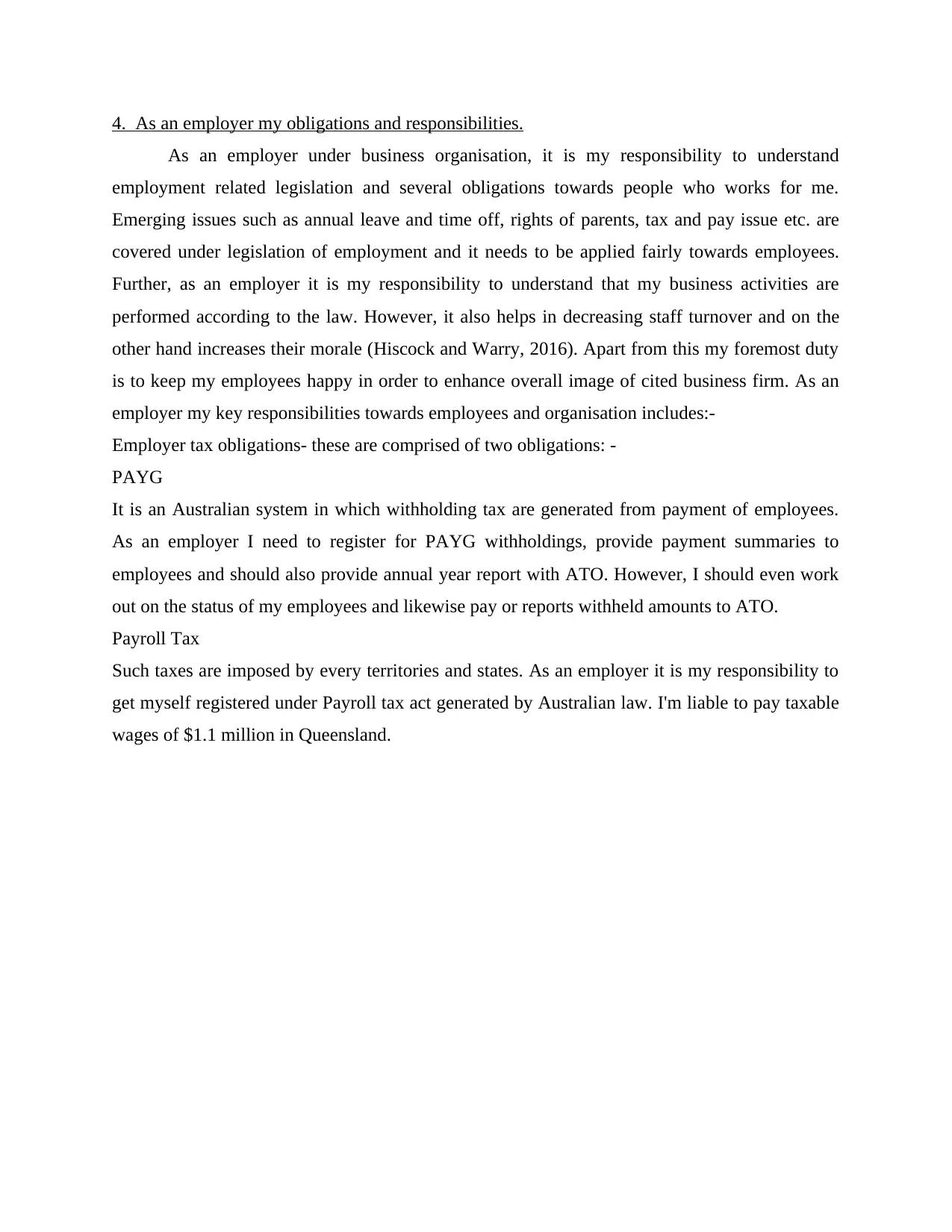
4. As an employer my obligations and responsibilities.
As an employer under business organisation, it is my responsibility to understand
employment related legislation and several obligations towards people who works for me.
Emerging issues such as annual leave and time off, rights of parents, tax and pay issue etc. are
covered under legislation of employment and it needs to be applied fairly towards employees.
Further, as an employer it is my responsibility to understand that my business activities are
performed according to the law. However, it also helps in decreasing staff turnover and on the
other hand increases their morale (Hiscock and Warry, 2016). Apart from this my foremost duty
is to keep my employees happy in order to enhance overall image of cited business firm. As an
employer my key responsibilities towards employees and organisation includes:-
Employer tax obligations- these are comprised of two obligations: -
PAYG
It is an Australian system in which withholding tax are generated from payment of employees.
As an employer I need to register for PAYG withholdings, provide payment summaries to
employees and should also provide annual year report with ATO. However, I should even work
out on the status of my employees and likewise pay or reports withheld amounts to ATO.
Payroll Tax
Such taxes are imposed by every territories and states. As an employer it is my responsibility to
get myself registered under Payroll tax act generated by Australian law. I'm liable to pay taxable
wages of $1.1 million in Queensland.
As an employer under business organisation, it is my responsibility to understand
employment related legislation and several obligations towards people who works for me.
Emerging issues such as annual leave and time off, rights of parents, tax and pay issue etc. are
covered under legislation of employment and it needs to be applied fairly towards employees.
Further, as an employer it is my responsibility to understand that my business activities are
performed according to the law. However, it also helps in decreasing staff turnover and on the
other hand increases their morale (Hiscock and Warry, 2016). Apart from this my foremost duty
is to keep my employees happy in order to enhance overall image of cited business firm. As an
employer my key responsibilities towards employees and organisation includes:-
Employer tax obligations- these are comprised of two obligations: -
PAYG
It is an Australian system in which withholding tax are generated from payment of employees.
As an employer I need to register for PAYG withholdings, provide payment summaries to
employees and should also provide annual year report with ATO. However, I should even work
out on the status of my employees and likewise pay or reports withheld amounts to ATO.
Payroll Tax
Such taxes are imposed by every territories and states. As an employer it is my responsibility to
get myself registered under Payroll tax act generated by Australian law. I'm liable to pay taxable
wages of $1.1 million in Queensland.
Paraphrase This Document
Need a fresh take? Get an instant paraphrase of this document with our AI Paraphraser
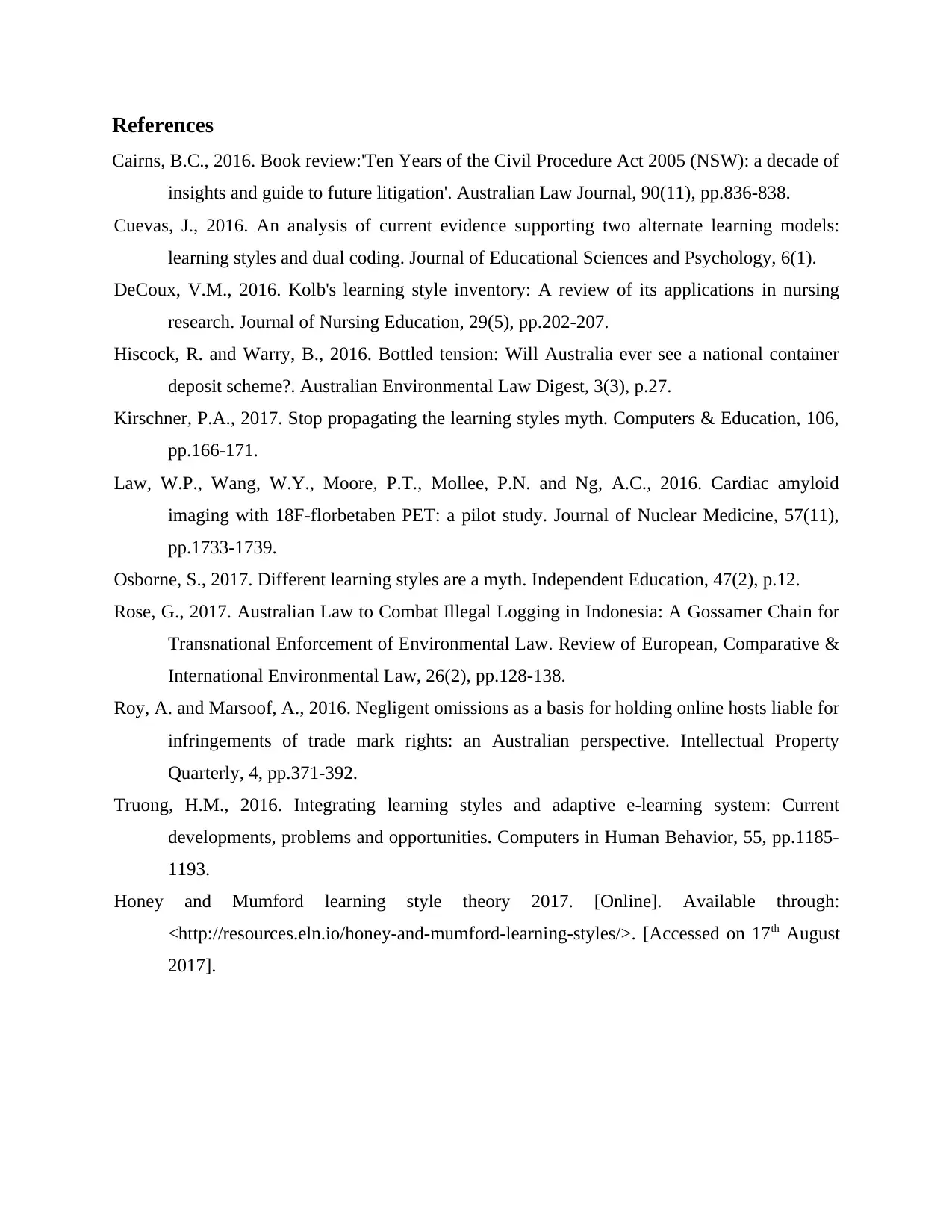
References
Cairns, B.C., 2016. Book review:'Ten Years of the Civil Procedure Act 2005 (NSW): a decade of
insights and guide to future litigation'. Australian Law Journal, 90(11), pp.836-838.
Cuevas, J., 2016. An analysis of current evidence supporting two alternate learning models:
learning styles and dual coding. Journal of Educational Sciences and Psychology, 6(1).
DeCoux, V.M., 2016. Kolb's learning style inventory: A review of its applications in nursing
research. Journal of Nursing Education, 29(5), pp.202-207.
Hiscock, R. and Warry, B., 2016. Bottled tension: Will Australia ever see a national container
deposit scheme?. Australian Environmental Law Digest, 3(3), p.27.
Kirschner, P.A., 2017. Stop propagating the learning styles myth. Computers & Education, 106,
pp.166-171.
Law, W.P., Wang, W.Y., Moore, P.T., Mollee, P.N. and Ng, A.C., 2016. Cardiac amyloid
imaging with 18F-florbetaben PET: a pilot study. Journal of Nuclear Medicine, 57(11),
pp.1733-1739.
Osborne, S., 2017. Different learning styles are a myth. Independent Education, 47(2), p.12.
Rose, G., 2017. Australian Law to Combat Illegal Logging in Indonesia: A Gossamer Chain for
Transnational Enforcement of Environmental Law. Review of European, Comparative &
International Environmental Law, 26(2), pp.128-138.
Roy, A. and Marsoof, A., 2016. Negligent omissions as a basis for holding online hosts liable for
infringements of trade mark rights: an Australian perspective. Intellectual Property
Quarterly, 4, pp.371-392.
Truong, H.M., 2016. Integrating learning styles and adaptive e-learning system: Current
developments, problems and opportunities. Computers in Human Behavior, 55, pp.1185-
1193.
Honey and Mumford learning style theory 2017. [Online]. Available through:
<http://resources.eln.io/honey-and-mumford-learning-styles/>. [Accessed on 17th August
2017].
Cairns, B.C., 2016. Book review:'Ten Years of the Civil Procedure Act 2005 (NSW): a decade of
insights and guide to future litigation'. Australian Law Journal, 90(11), pp.836-838.
Cuevas, J., 2016. An analysis of current evidence supporting two alternate learning models:
learning styles and dual coding. Journal of Educational Sciences and Psychology, 6(1).
DeCoux, V.M., 2016. Kolb's learning style inventory: A review of its applications in nursing
research. Journal of Nursing Education, 29(5), pp.202-207.
Hiscock, R. and Warry, B., 2016. Bottled tension: Will Australia ever see a national container
deposit scheme?. Australian Environmental Law Digest, 3(3), p.27.
Kirschner, P.A., 2017. Stop propagating the learning styles myth. Computers & Education, 106,
pp.166-171.
Law, W.P., Wang, W.Y., Moore, P.T., Mollee, P.N. and Ng, A.C., 2016. Cardiac amyloid
imaging with 18F-florbetaben PET: a pilot study. Journal of Nuclear Medicine, 57(11),
pp.1733-1739.
Osborne, S., 2017. Different learning styles are a myth. Independent Education, 47(2), p.12.
Rose, G., 2017. Australian Law to Combat Illegal Logging in Indonesia: A Gossamer Chain for
Transnational Enforcement of Environmental Law. Review of European, Comparative &
International Environmental Law, 26(2), pp.128-138.
Roy, A. and Marsoof, A., 2016. Negligent omissions as a basis for holding online hosts liable for
infringements of trade mark rights: an Australian perspective. Intellectual Property
Quarterly, 4, pp.371-392.
Truong, H.M., 2016. Integrating learning styles and adaptive e-learning system: Current
developments, problems and opportunities. Computers in Human Behavior, 55, pp.1185-
1193.
Honey and Mumford learning style theory 2017. [Online]. Available through:
<http://resources.eln.io/honey-and-mumford-learning-styles/>. [Accessed on 17th August
2017].
1 out of 8
Related Documents
Your All-in-One AI-Powered Toolkit for Academic Success.
+13062052269
info@desklib.com
Available 24*7 on WhatsApp / Email
![[object Object]](/_next/static/media/star-bottom.7253800d.svg)
Unlock your academic potential
Copyright © 2020–2026 A2Z Services. All Rights Reserved. Developed and managed by ZUCOL.





